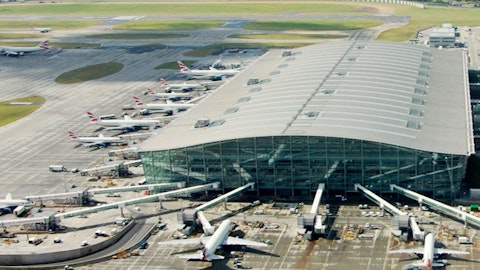Pablo Ricalde: Hi, everyone. Thanks for taking my question. I have a question on the [indiscernible] as well. And now that you have to discount using a WACC, which level of debt you have to use? The one that you have on the Mexico structure or the one that you have consolidated? That’s my question.
Adolfo Castro: Pablo, there is no way to understand what you’re saying. Your line is cutting in a very bad way.
Pablo Ricalde: I don’t know if you can hear me better now.
Adolfo Castro: Well, more or less.
Pablo Ricalde: I have a question on the debt you have to use to calculate the WACC on the new discount rate. Do you have to use the one in Mexico or you have to use the one consolidated?
Adolfo Castro: Well in the case of that, you can see a paragraph there in the document we have filed last week that says that in terms of the debt, it should only be included in operations in Mexico. So, if you are using consolidated and financial statements of Cancun, you must exclude what is related to Puerto Rico and Colombia.
Pablo Ricalde: Okay. Perfect.
Adolfo Castro: You’re welcome.
Operator: Thank you. Our next question comes from the line of Pablo Monsivais with Barclays. Please go ahead.
Pablo Monsivais: Hi, Adolfo. Thanks for taking my question. I just have two quick questions. The first one is on the commercial revenues per passenger in Mexico. On the dollar basis, it has increased a lot, and you just mentioned the opening of new spaces. But if you have more info — more detail, will be good. Also, on the expectation for year-end on international travel to Cancun. I mean, international travel has decreased over the last few months. How are you seeing the final stretch of the year? Thank you.
Adolfo Castro: Well, in the case of commercial revenue, we are having some effects, of course, from the Mexican strong peso. So, that was the case of duty-free. Now, that is the case of some other activities that are related to foreign people. In the case of the traffic, as I had mentioned during the initial remarks, what we saw from the quarter, on the first side, we have to understand that there should be a normalization of the numbers. Normalization means that no more double-digit numbers, no more external growths. But in the case of international, the decrease was related to the traffic to and from Europe and to and from South America. In the case of the U.S. and Canada, was a slight increase that offset these negatives. But the strong peso, of course, is taking some foreign people out from this country. That’s true.
Pablo Monsivais: Thank you.
Adolfo Castro: You’re welcome.
Operator: Thank you. Our next question comes from the line of Arthur Suelotto with APO Capital. Please go ahead.
Arthur Suelotto: Thank you. Good morning, Adolfo. Just a quick follow-up, please, regarding the concessions. Are you in talks to extend the terms of your concession at this point? I know that someone asked this previously, but just I couldn’t get your answer. Just to check if you are discussing this with the government at this point, considering all the changes that were announced recently. Thank you.
Adolfo Castro: Well, we are exactly at the middle of the term, so the original term was 50 years where we have 25 in front. And as I had mentioned, we are not in talks at all about extension of the concession.
Arthur Suelotto: Very clear. Thank you.
Adolfo Castro: You’re welcome.
Operator: Thank you. Our next question comes from the line of Luis Lama with BlackRock. Please go ahead.
Luis Lama: Hi, Adolfo. Thanks for taking the question. I’m just trying to clarify something that is a bit ambiguous on the new regulatory document. So, are these changes to be applied at the end of this current MDP cycle or only for the next cycle?




